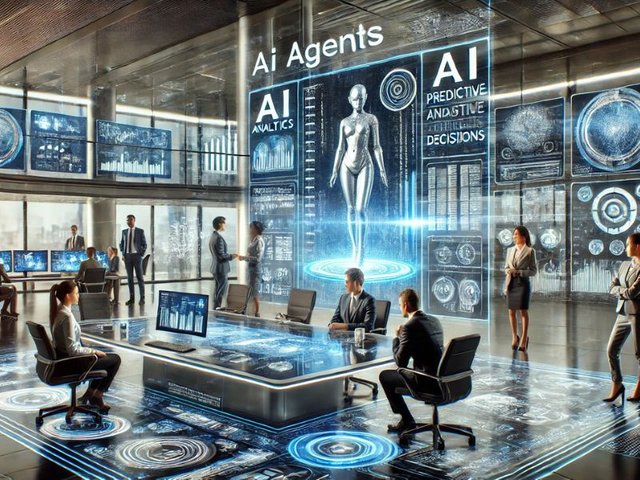Harnessing AI Agents for Smarter Decision-Making

In today’s fast-paced, data-driven world, making smarter decisions isn’t just a luxury—it’s a necessity. The rise of Artificial Intelligence (AI) agents has ushered in a new era of decision-making, where businesses and individuals can leverage advanced algorithms to process vast amounts of data, extract meaningful insights, and make informed choices faster than ever before. This blog explores how AI agents are transforming decision-making processes, their key applications, and what the future holds for this exciting technology.
What Are AI Agents?
AI agents are software programs designed to perform tasks autonomously, often mimicking human intelligence. They can perceive their environment, process information, and take actions toward achieving specific goals. Some well-known types of AI agents include:
- Reactive Agents: These respond to stimuli without storing past information.
- Proactive Agents: These leverage past experiences and data to predict and act.
- Hybrid Agents: A combination of reactive and proactive behaviors.
AI agents integrate technologies like machine learning, natural language processing (NLP), and neural networks to analyze complex datasets and perform tasks ranging from customer service to advanced financial forecasting.
Key Benefits of AI Agents in Decision-Making
Real-Time Data Analysis
AI agents can process and analyze data in real-time, allowing businesses to react to market changes, customer behavior, and other dynamic factors promptly. For instance, in e-commerce, AI agents can monitor customer preferences and recommend products instantly.Enhanced Predictive Accuracy
By learning from historical data, AI agents improve the accuracy of predictions. This capability is invaluable in fields like supply chain management, where anticipating demand fluctuations can lead to reduced costs and better inventory management.Unbiased Decision-Making
Unlike human decision-makers, AI agents are free from emotional or cognitive biases. This ensures objective decisions based purely on data-driven insights.Increased Efficiency
AI agents automate repetitive and time-consuming tasks, allowing human professionals to focus on higher-order decision-making and strategy development.
Applications of AI Agents in Smarter Decision-Making
1. Business Intelligence (BI) and Analytics
AI agents power advanced BI tools by analyzing business operations, market trends, and customer data. They provide actionable insights, helping executives make informed decisions on pricing, marketing, and resource allocation.
2. Healthcare
In healthcare, AI agents analyze patient data, medical records, and real-time health metrics to recommend personalized treatments or identify potential risks. For example, AI-powered diagnostic tools help doctors detect diseases like cancer at an early stage.
3. Financial Services
AI agents are transforming financial decision-making through fraud detection, credit scoring, and portfolio optimization. They analyze market trends to suggest investment opportunities or flag irregularities in financial transactions.
4. Autonomous Systems
AI agents are essential in autonomous systems like self-driving cars, drones, and robotics. They make split-second decisions based on real-time data from sensors and cameras, ensuring safety and efficiency.
5. Smart Cities and Infrastructure
AI agents are used in urban planning, traffic management, and energy optimization. For instance, AI systems in smart cities can adjust traffic light timings based on real-time congestion data, reducing commute times and fuel consumption.
6. Retail and Customer Service
From personalized recommendations in online shopping to chatbots providing 24/7 customer support, AI agents are redefining customer interactions. They analyze user behavior and preferences to deliver tailored experiences.
Challenges in Implementing AI Agents
While AI agents bring transformative potential, their adoption comes with challenges:
- Data Privacy Concerns: The use of personal data for decision-making can raise ethical and legal issues.
- Algorithmic Bias: If training data is biased, AI agents may replicate those biases in their decisions.
- Integration Complexity: Integrating AI agents with existing systems and workflows can be resource-intensive.
- Dependence on Quality Data: AI agents require high-quality, accurate data to function effectively.
The Future of AI Agents in Decision-Making
The evolution of AI agents is just beginning, with emerging trends set to redefine their capabilities:
- Explainable AI (XAI): Enhancing transparency in AI decision-making processes to build trust and understanding among users.
- Collaborative AI Agents: AI agents that work alongside humans, blending computational efficiency with human creativity.
- Industry-Specific AI Agents: Tailored agents designed to solve niche problems in industries like agriculture, education, and manufacturing.
- Integration with IoT: Combining AI agents with Internet of Things (IoT) devices to enable smarter homes, factories, and cities.
- Decentralized AI: Leveraging blockchain technology to create decentralized AI agents that ensure security and privacy.
Conclusion
AI agents are revolutionizing decision-making across industries by offering unprecedented speed, accuracy, and efficiency. From optimizing business processes to transforming healthcare and beyond, their impact is vast and growing. However, as we harness the power of AI agents, it’s crucial to address challenges like data privacy, algorithmic bias, and ethical concerns to ensure their responsible use.
The journey of smarter decision-making has only just begun. As AI agents continue to evolve, they promise to unlock new opportunities and transform how we live, work, and make choices in the years to come.
Are you ready to embrace the AI-driven future of decision-making? The time to start is now.